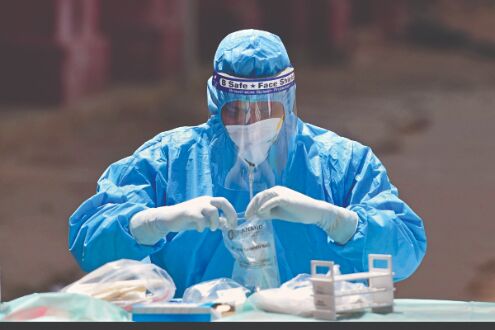Shortage of distilled water could be fuelling rare post-Covid fungal infections in Capital

New Delhi: Cases of Mucormycosis, or black fungus, a rare fungal infection and post Covid-19 complication, are on the rise across the city. Experts have said that the chief reasons for the occurrence and spread of this deadly fungal disease are cross-contamination, a pre-diabetic or diabetic population, and immune-suppression side effects from using steroids.
But one reason for the cross-contamination is the use of tap water instead of distilled or boiled water in humidifiers. Ideally, medical grade distilled water or thoroughly boiled water should be used with clean and dry instruments. However, that is not always the case.
"Distilled water is available in pharmacies in very small quantities because it is used to turn powder injections into injectable solutions. It is not available in large enough quantities as is required for ventilator usage etc. And use of industrial grade distilled water that is used in batteries etc is not recommended because the bottle itself is not sterilised. So you can't go to a petrol pump to get distilled water, it has to be medical grade," said Dr Manish Munjal, ENT surgeon at Sir Ganga Ram hospital, where Delhi's first case of Mucormycosis as a post covid complication was detected last year in December.
He said that at home, to avoid water contamination, one can simply use thoroughly boiled water (boiled for 20 min and then cooled down) but make sure that the containers in which the water is stored are also cleaned and dried thoroughly.
However, healthcare workers at smaller private hospitals, and even large public hospitals, said due to high caseload and insufficient staff and equipment, they are forced to use tap water in humidifiers.
They agree that in the absence of distilled or boiled water, at least the water being used in humidifiers should be changed daily and the instrument should be kept clean and dry when not in use.
However, "There is such a shortage of equipment (and high demand) and very little manpower, staff is not able to manage the workload and attend to other demands of other patients at the same time," one healthcare worker said.
Dr Munjal said that most Covid patients recover at home and some at hospitals. "Mucormycosis is actually a contaminant that comes into our body. It is rare, seen in only 1 in a 1,000 patients who had moderate to severe Covid and were given heavy steroids during their treatment. Contamination sites can include nasal cannulas which are used to give oxygen (in covid patients managing their treatment at home) or oxygen concentrators," he said.
Many times oxygen concentrators are not bought, they are exchanged or given on rent and medical rental companies give suction machines etc on rent as well. Contamination can happen through home surfaces, medical devices, patient to patient or attendent to patient sometimes. People who get contaminated are a particular class of patients who have been treated not for mild covid but for moderate or severe covid where they were given immunosuppressants in terms of steroids, Dr Munjal explained
One reason behind more cases of black fungus in India as compared to western countries could be because India has a pre-diabetic population. "All patients who were critically ill (due to developing mucormycosis post Covid) already had high sugar levels as a baseline and their sugar levels were pushed up due to use of steroids. Indian population in urban cities are prediabetic and have high sugar levels and carbohydrate intake. We also lag behind our western counterparts when it comes to hygiene", Dr Munjal said.
Ganga Ram hospital has started an advisory group which is now taking samples from all possible sites of contamination. All India Institute of Medical Sciences has created a separate ward to treat black fungus patients.



